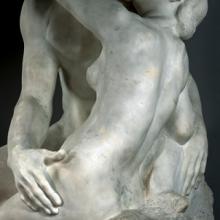plato
IF IT'S CURRENT, it’s cool. Anything old, unless it’s retro, is worth ignoring. C.S. Lewis called that attitude “chronological snobbery.” He defined it as “the uncritical acceptance of the intellectual climate of our own age and the assumption that whatever has gone out of date is on that count discredited.” Such an approach carries two distinct but related dangers: One, as Arthur Lindsley of the C.S. Lewis Institute put it, “we need the help of past ages in order to see our own times more clearly.” And two, we lose the ability to benefit from truths discerned by our predecessors — the wisdom of the ages.
CHANGE IS DIFFICULT, great change even more so. Yet some things change naturally over time with seemingly little effort—the course of a river, the shore of an ocean, the direction a tree decides to grow. When humans interfere with the course of nature in an unnatural and thoughtless manner—such as by damming a river or clear-cutting a forest—we are bound to experience unknown and often unwanted consequences. But perhaps reverting to more natural systems of change will not be as difficult as we imagine.
Western civilization is just beginning to realize that nature is wiser and more powerful than we are and will, without a doubt, outlive us. She knows her mind, and she understands what keeps life in balance. Because today we seldom see nature in her unmolested glory, we rarely consider the degree to which Western civilization has changed that which is natural to what is now unnatural. Since time immemorial, Indigenous people have learned to observe natural change and tried to flow with it, or bend it to their benefit.
Now, like never before, we need people with keen observational skills to help us recover and retain the truths in nature. Indigenous wisdom’s long relationship with creation is based on an ethic of harmony, humility, and respect. Such efforts need not always contradict Western notions of science. Modern scientific methods often confirm the truths that our Indigenous teachers have always known. Science verifies what scientists observe. In more than one sense, our Indigenous elders have always been scientifically aware. Western scientists use tools that tell them the hydrological cycles have changed. Our elders know the huckleberries are ripening a month later than they always have. I have heard from elders in the past few years that our medicine plants are not nearly as potent as they used to be. They say the earth is weakening; an unnatural change has occurred. Western science has come to the same realization by explaining that as more carbon is released into the atmosphere, plants are less able to develop the nutrients needed. Both observe verifiable knowledge. But one is abstract while the other is personal. What modern science tells Western society about creation, our Indigenous “scientists” have been observing for millennia. What we can agree upon together is that the earth is changing, unnaturally, and it is not a good change.
It's odd that Christians — people who claim to believe that God created the earth, sustains it day by day, and intends to create a new earth — are often so mixed up about sex and food. How long would the earth's inhabitants last without coupling and eating?
And yet most Christian writers right up to the 16th century praised celibacy, sexless marriages, and arduous fasting. Bless Martin Luther for loving his wife (and the beer she brewed), but lots of us still seem to think that good sex and good food — if not actually sinful — are at least pretty low on the religious values hierarchy.
Has it escaped our attention that, according to our most sacred literature, God made a naked male and a naked female, put them in the midst of grain fields and orchards, and told them to multiply?
MY FIRST GUIDED tour of Indianapolis was with a real estate agent, crisscrossing the city in his gleaming black Lexus. He spoke as he drove, filling the air with phrases such as, “Now, this is a terrific neighborhood,” and “You’ll want to steer clear of that one over there.”
As you’d guess, he focused on amenities, or the lack of them: hip restaurants, nearby shopping, nice parks, great schools. Security and consumables, good neighborhoods and bad. A mental map of the city took shape as we drove.
My second tour, just a few days later, was quite different—so different that it changed my life. This time the guide was one of the faculty members at Christian Theological Seminary, the school where I had just been appointed president. She’d lived in the city for more than 20 years, and on her tour, consumables came up now and then, but they took a definite back seat to the creative, groundbreaking ministries going on around town.
Her remarks frequently echoed the real estate agent’s, but from an entirely different angle. She’d say, “Now, this is a low-income neighborhood and a food desert [a section of the city where nutritious, affordable food isn’t readily available]—and right there on the corner is the amazing little church that’s started an organic community garden ministry.” Then a few minutes later: “Now, this is a middle-income neighborhood—and there’s the mosque that’s making a tremendous difference through its youth program.” And so on.

Over easy. Image via http://bit.ly/xaNg0h.
At this morning's National Prayer Breakfast, President Obama made clear just how pure a postmillennialist Midwestern mainline Protestant he is.
He spoke of how we as individuals acting in community "help bring His kingdom to Earth." And he emphasized the connection between his piety and his public efforts to to make that kingdom a reality.


